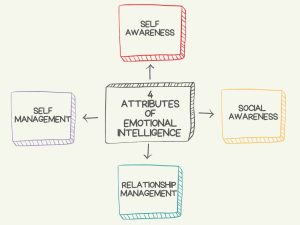Some might define emotional intelligence as being in tune with one’s emotions, being aware of one’s strengths and weaknesses, or simply being ‘nice’ to others.
Though not entirely wrong, what’s missing in these interpretations would be the inclusion of one’s relationships with others and their social environments. In any situation, emotional intelligence causes a ripple effect on our interactions with others.
What is emotional intelligence, and why do we need it?
Psychologist and best-selling author Daniel Goleman says that emotional intelligence refers to our ability to recognise and manage our emotions, and the capacity to understand and influence the feelings of others. Such self and social awareness stimulates compassion for others, enabling more effective communication with different types of people in various situations.
The four attributes of emotional intelligence

How can you improve Emotional Intelligence?
1. Self-awareness
We tend to make rash decisions when we allow emotions to influence our judgement, whether we are stressed or feeling good. An example would be exorbitant spending in the guise of ‘treating yourself’ whilst in a fleeting good mood, only to regret it later when the bills come in.
Consultant Gabriel Tan shared that we’re all emotional beings, and can be easily swayed by all kinds of emotions. Taking hold of your emotions could make you a wiser decision-maker.
Pro tip: Make an effort to be emotionally present by taking a step back to recognise your thoughts and emotions, and consider how your actions will impact you and those around you.
2. Self-management
Self-management is what we do with the information gathered from self-awareness. There are several key areas we can work on to get better at it:
- Authenticity
- Adaptability
- Optimism
Be authentic about your emotions and stay true to your values. This doesn’t mean sharing everything, but rather being consciously transparent about your beliefs, priorities and intentions in decision-making.
Adaptability means staying open-minded and finding diverse and innovative solutions to tackle challenges. Observe, learn, or ask for guidance from those around you. Reset and reframe your focus to objectively view things or practice self-talk like, ‘Just because I’m in a bad mood doesn’t mean I’ll have a bad day.’
Optimism doesn’t mean turning a blind eye toward negativity, but reframing your mindset to filter out the valuable lessons or experiences that come from the situation. Putting your thoughts into perspective helps form realistic interpretations that give you a more positive outlook toward situations and people.
3. Social awareness
Ever been told to ‘read the room?’ As we get better at managing our feelings and emotions, we’ll also need to learn how to read others’ emotions to make our interpersonal relationships more effective.
The simplest example of being socially aware is paying attention to a person’s body language, and then planning our responses accordingly. Rather than being quick to assume, listen to understand first.
Gabriel gathered from his experience that socially aware people often create healthy social environments. Companies with a great work culture don’t get formed overnight. Taking small initiatives through understanding, observing, and respecting one another’s differences is a great start.
4. Relationship management
In any healthy relationship, we hope to achieve self-development and the opportunity to develop others. Developing others is a skill we can cultivate through receiving and giving constructive feedback — this allows us to exchange and learn from others’ ideas, strengths, and knowledge.
Creating better conversations is another important aspect. Radio journalist and public speaker Celeste Headlee shares in a podcast that talking and conversing are two different things. To engage in better conversations, learn to ask questions that spark your curiosity. The goal is not to constantly prove that you’re better than everyone else, but to get others to be good talkers.
Cultivating emotional intelligence encourages you to constantly process and manage your emotions. After successfully doing that, include others and make them feel important as you embark on your journey to success.
This article is contributed by Good Job Creations.
![]()















